|
|
|
Sort Order |
|
|
|
Items / Page
|
|
|
|
|
|
|
| Srl | Item |
| 1 |
ID:
103790
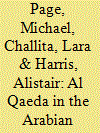

|
|
|
|
|
| Publication |
2011.
|
| Summary/Abstract |
Al Qaeda in the Arabian Peninsula has positioned itself at the vanguard of a media revolution in which terrorist groups both create and frame news events to an unprecedented extent. Through the publication of its e-magazine Sada al-Malahim (The Echo of Epic Battles), the organization has sought to mobilize both Yemeni and non-Yemeni Muslim, Arabic-speaking audiences to carry out violent jihad. This article utilizes the concept of collective action frames to analyze Al Qaeda in the Arabian Peninsula's media output, identifying the organization's grievance narratives, ideological justifications for violent actions, and means to strengthen its credibility among its intended audiences.
|
|
|
|
|
|
|
|
|
|
|
|
|
|
|
|
| 2 |
ID:
178786
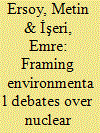

|
|
|
|
|
| Summary/Abstract |
‘The age of sustainable development’ has been characterized by an on-going debate over how to define development and which alternative energy resources to rely upon. It is high time to rethink the news media's role in this debate due to transformations in journalism, particularly the role of the media in harnessing the sustainable energy transition. Accordingly, this paper examines the role of the news media in environmental debates over Turkey's nuclear program within the country's polarized media system. Adopting a content analysis method, the paper illuminates how selected media outlets (three mainstream and one online alternative) have framed and disseminated debates over Turkey's nuclear program. The findings reveal that the media system matters in public debates on energy, but also that the alternative media have the potential to contribute to societal debates on issues – even within a polarized media setting – by voicing unspoken ideas.
|
|
|
|
|
|
|
|
|
|
|
|
|
|
|
|
| 3 |
ID:
167287
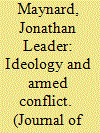

|
|
|
|
|
| Summary/Abstract |
A growing wave of scholarship suggests that ideology has demonstrable effects on various forms of armed conflict. But ideology remains a relative theoretical newcomer in conflict research, and scholars lack developed microfoundations for analyzing ideologies and their effects. Typically, existing research has primarily presented ideology as either an instrumental tool for conflict actors or a source of sincere political and normative commitments. But neither approach captures the diverse ways in which contemporary social science theorizes the causal connection between ideas and action, and both struggle to reconcile the apparently strong effects of ideology on conflict at the collective level with the relative rarity of ‘true believers’ at the individual level. This article addresses such problems by providing key microfoundations for conceptualizing ideologies, analyzing ideological change, and explaining ideologies’ influence over conflict behavior. I emphasize that ideology overlaps with other drivers of conflict such as strategic interests and group identities, show how ideologies can affect conflict behavior through four distinct mechanisms – commitment, adoption, conformity, and instrumentalization – and clarify the role of both conflict pressures and pre-existing ideological conditions in ideological change. These microfoundational claims integrate existing empirical findings and offer a foundation for building deeper explanations and middle-range theories of ideology’s role in armed conflict.
|
|
|
|
|
|
|
|
|
|
|
|
|
|
|
|
| 4 |
ID:
148284
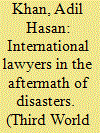

|
|
|
|
|
| Summary/Abstract |
In the present lives in the postcolony are beset by relentless disasters, generating great suffering and loss. How should an international lawyer conduct herself in response? Resisting the urge to construct these times as entirely unprecedented, this article attempts a response by drawing out the conduct of two ancestral Third World international lawyers responding to disasters in their own time. It reveals how disasters never simply occur but are actively produced by particular modes of conduct deployed by international lawyers. From their conduct we learn how to attend to the tasks of justice and responsibility in the aftermath of disaster by being responsive to the suffering and by recognising the disastrous effects of our action. We also learn how attending to the tasks of inheritance is vital for this.
|
|
|
|
|
|
|
|
|
|
|
|
|
|
|
|
| 5 |
ID:
190022
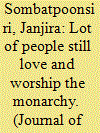

|
|
|
|
|
| Summary/Abstract |
This article examines the interplay between nonviolent movements’ use of polarizing issues for mobilization and pro-regime countermobilization. Thailand has been chosen as an explanatory case study because it has a history of political polarization and pro-regime mass mobilization. I focus on polarizing frames that were incorporated into the 2020 nonviolent resistance campaigns, which addressed a taboo subject in the country: the monarchy. In response, the regime applied various forms of repression, including the mobilization of royalists. But the assumption that the regime single-handedly mobilized countermovements is only half of the story. Autonomous elements within countermovements also joined forces when there were sufficient social conditions. By juxtaposing protest event data with an analysis of mobilizing frames (through movements’ Twitter hashtags), I shed light on a two-pronged process that underpins the nexus between framing choice and countermobilization: (a) how a movement’s choice for polarizing frames sustains existing ideological and identity-based cleavages, antagonizing segments of society that perceive their collective identity to be under siege and; (b) how these ideological and identity-based cleavages also provide social sources for countermobilization. I conclude by addressing some implications of this framing choice–countermobilization nexus on repression dynamics and suggest how we can rethink the relationship between strategic framing and nonviolent resistance campaigns in divided societies.
|
|
|
|
|
|
|
|
|
|
|
|
|
|
|
|
| 6 |
ID:
184080
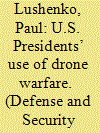

|
|
|
|
|
| Summary/Abstract |
Scholars often reduce America's use of drones to a bureaucratic process. While this enables them to recognise shifts in America's use of strikes since 2002, they cannot adequately explain such change over time. Rather, I argue that America's use of strikes is a function of presidents' decisions. Presidents adopt strategic and legal-normative cognitive frames that shape their decisions to use strikes. I use this typology to study crucial and pathway cases during the Obama and Trump administrations. I show that presidents' decisions to use drones are made to achieve state and social goals. The balance between these aims is informed by, and constitutive of, presidents' strategic and legal-normative frames. Understanding America's use of drones as a leader-driven practice suggests that the legitimacy of strikes may relate more to their impact on the relationship between norms and interests, and not the military or political nature of targets, as some ethicists claim.
|
|
|
|
|
|
|
|
|
|
|
|
|
|
|
|
| 7 |
ID:
140867
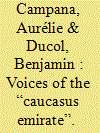

|
|
|
|
|
| Summary/Abstract |
This article looks at Internet use by insurgent groups in the North Caucasus in the context of a regional diffusion of violence. Using a mixed methods research design that combines hyperlink network analysis and micro-discourse analysis, it examines the online characteristics of the Caucasus Emirate and the main frames conveyed by the websites affiliated with the Emirate. It demonstrates the existence of a network of cross-referencing websites that, collectively, articulate the Emirate's political agenda online and allow for the dissemination of frames across the Web. It also shows that while jihadism provides a cultural resource that fosters a global sense of community, the jihadization of discourse does not eradicate local references as the local dynamics of the conflict have a strong impact on online communicative strategies. Finally, although based on a specific case study, this article highlights the potential of a mixed methods research design as applied to an analysis of virtual insurgent networks.
|
|
|
|
|
|
|
|
|
|
|
|
|
|
|
|
|
|
|
|
|